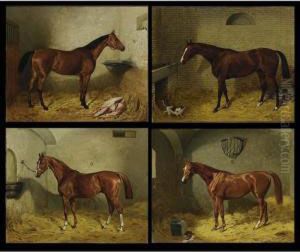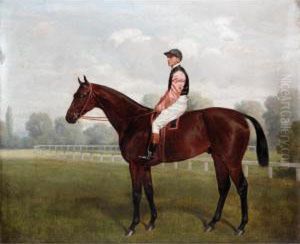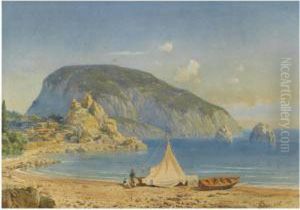Emile Villiers De L'Isle-Adam Paintings
Jean-Marie-Mathias-Philippe-Auguste, comte de Villiers de L'Isle-Adam, was a French writer and playwright, born on November 7, 1838, in Saint-Brieuc, Brittany, France. He hailed from an ancient noble family that claimed descent from the original rulers of the Breton island of L'Isle-Adam. However, his birth into nobility did not grant him the wealth and comfort often associated with such lineage. Villiers's life was marked by financial difficulties and a constant struggle for recognition in the literary circles of his time.
Villiers de L'Isle-Adam is best known for his works in the Symbolist movement, which sought to express the more abstract, intangible aspects of the human experience through a refined and suggestive use of language. His writing is characterized by a blend of the macabre, the fantastical, and the philosophical, often exploring themes of idealism, disillusionment, and the quest for the absolute. His most famous works include the collection of stories 'Contes Cruels' (1883), which introduced readers to his unique blend of horror and fantasy with a philosophical edge, and the novel 'L'Ève future' (1886), considered a pioneering work of science fiction that delves into themes of artificial intelligence and the nature of love.
Despite his innovative contributions to literature, Villiers struggled to gain the critical and commercial success he yearned for during his lifetime. His works, though now regarded as precursors to many modernist and surrealist movements, were often met with indifference or outright hostility by the critics of his day. Villiers's personal life was equally fraught with challenges, including a failed marriage and the untimely death of his son, events that deeply affected him and influenced his writing.
Villiers de L'Isle-Adam died on August 19, 1889, in Paris, at the age of 50. His death was mourned by a small but devoted group of admirers, including some of the leading literary figures of the time. In the years following his death, Villiers's work gained a posthumous recognition that had eluded him in life, with his stories and novels influencing a wide range of writers and artists across various movements. Today, he is celebrated as a visionary writer whose works explore the complexities of the human condition and the dark recesses of the imagination.




